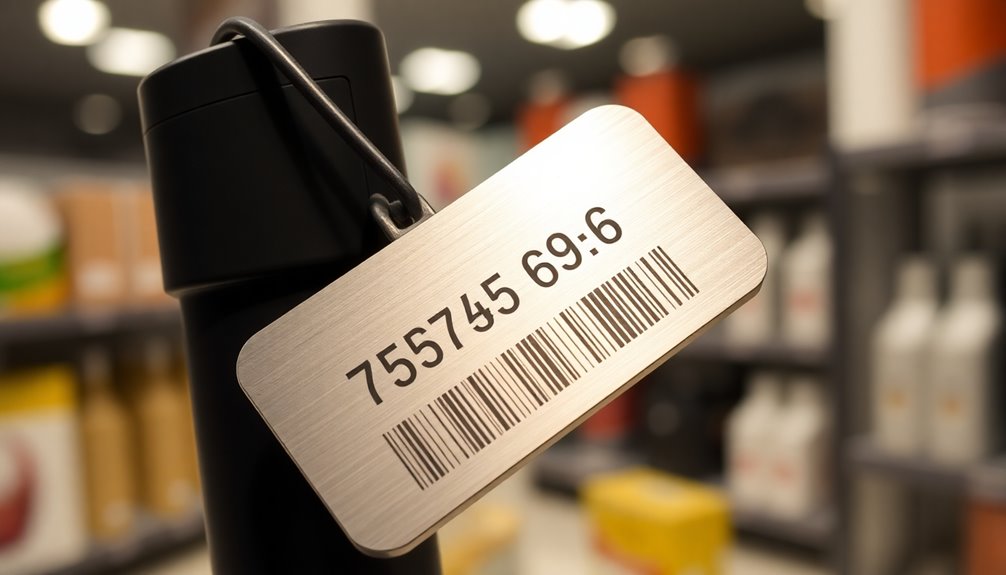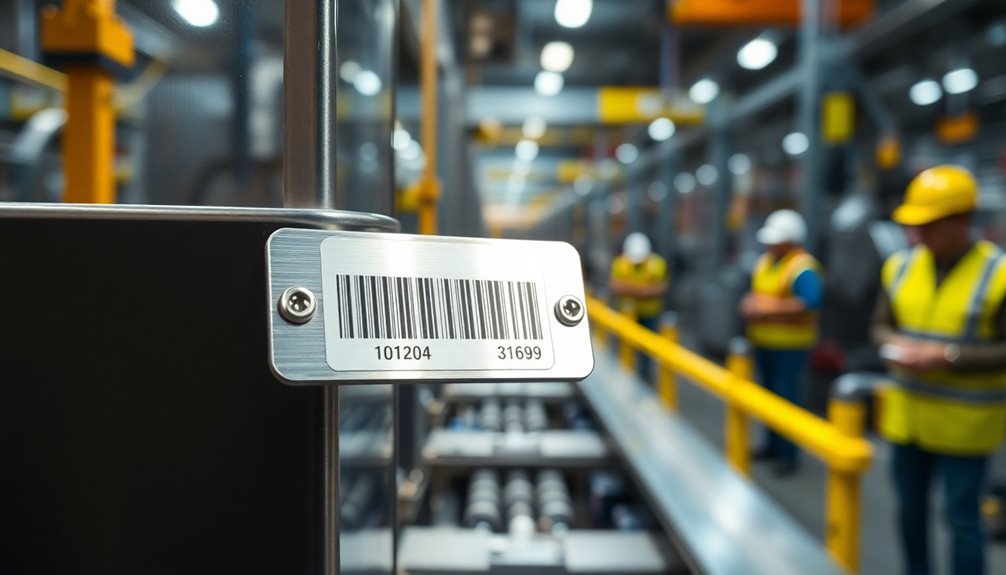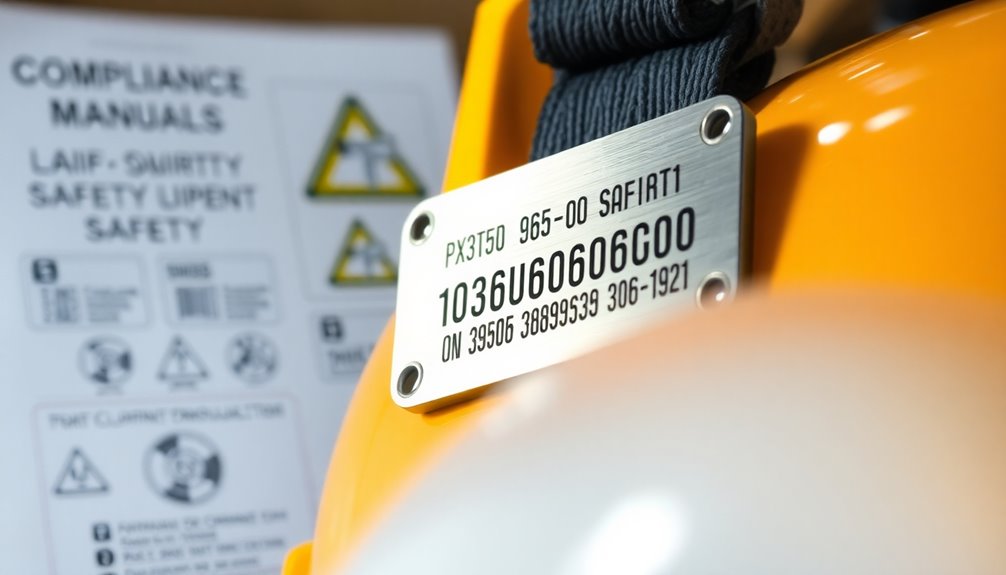A Product ID is a unique identifier assigned to each product, making tracking and inventory management easier for you. It helps reduce errors, guarantees regulatory compliance, and maintains brand trust. In retail, for example, it streamlines transactions and prevents stockouts. You'll often see it as barcodes or QR codes that contain essential information like the manufacturer's details and safety compliance data. Using standardized Product IDs, like UPC or EAN, enhances operational efficiency and quality control. If you're curious about how Product IDs can further benefit your business, there's more to uncover on this topic.
Definition of Product ID
Understanding what a Product ID is can considerably simplify your inventory management and shopping experience. A Product ID is a unique identifier assigned to each product, designed to distinguish it from others in the market. This helps you track inventory efficiently and guarantees you always know what you have on hand. Regularly performing backup restoration processes is vital to ensure that your inventory data remains intact and recoverable in case of any disruptions. Additionally, having a consistent backup schedule can protect against data loss that might affect your inventory records.
Common examples of Product IDs include UPC (Universal Product Code), GTIN (Global Trade Item Number), and SKU (Stock Keeping Unit). Each serves a specific purpose across various industries, making it easier for retailers and customers alike to identify products.
These identifiers can be numerical or alphanumerical, often displayed alongside barcodes or QR codes on packaging for quick scanning. The uniqueness of Product IDs is crucial, as it prevents confusion in inventory management and assures accurate data entry during transactions. Properly implementing Product IDs enhances operational efficiency, reduces errors, and boosts product visibility. Additionally, plugins for e-commerce sites can help automate the management of inventory tracking and streamline the identification process for better results.
When you understand and utilize Product IDs, you streamline the identification process in both retail and eCommerce environments. This not only improves your shopping experience but also supports better inventory control, making it easier to manage your products effectively.
Importance of Product IDs
In the domain of inventory management and retail operations, the importance of Product IDs can't be overstated. These unique product identifiers, like UPCs and GTINs, are essential for several reasons:
- Efficient Inventory Management: Product IDs streamline the tracking of products throughout their lifecycle, making it easier for you to manage stock levels and reduce errors. Regular backups of inventory data ensure that this information remains accurate and up-to-date, highlighting the need for consistent backup frequency to protect against data loss.
- Regulatory Compliance: They enhance compliance by guaranteeing proper labeling and classification, especially in industries like healthcare and manufacturing where regulations are strict.
- Traceability: Using Product IDs greatly improves traceability, critical for managing hazardous materials and guaranteeing consumer safety during product recalls. This way, you can quickly identify affected products.
- Prevention of Mislabeling: Consistent application of Product IDs helps prevent mislabeling and overselling, maintaining brand trust and enhancing overall customer satisfaction.
Additionally, implementing a robust system for managing Product IDs can serve as a critical step in enhancing overall backup frequency and methods for your inventory data.
With these benefits, it's clear that Product IDs are indispensable tools in today's retail and inventory management landscape.
Data Included in Product IDs

When you examine Product IDs, you'll notice they contain essential information that enhances product management and compliance. Each Product ID serves as a unique identifier, allowing you to track and manage products effectively. It's important to ensure that the information linked to these IDs remains secure to prevent cyber threats that could compromise product data. Utilizing security plugins can help bolster your defenses against such threats.
You'll find the manufacturer's name and address, which provide significant details about the product's source. Additionally, the manufacturer's contact number is included, making it easy to reach out for inquiries or issues.
For hazardous materials, the Product ID features US DOT and HazCom chemical identifiers, guaranteeing compliance with safety regulations. This is crucial for maintaining safety standards and avoiding legal repercussions.
You'll also discover additional data like the chemical name, code number, and batch number, all of which are essential for traceability and inventory management. These components work together to guarantee that you can easily monitor stock levels and product origins.
Moreover, the data included in Product IDs reflects compliance with federal regulations, particularly for products subject to strict standards. By understanding this data, you can better manage your inventory and guarantee that your products meet necessary safety guidelines. Additionally, maintaining strong password security is vital to protect sensitive product information from potential breaches.
Types of Product Identifiers
Various types of product identifiers are commonly used to facilitate tracking and management across different markets. You'll find several key identifiers that serve distinct purposes:
- UPC (Universal Product Code): A 12-digit code primarily used in North America for retail tracking.
- EAN (European Article Number): Extending to 13 digits, this code is widely utilized in Europe for international goods identification.
- GTIN (Global Trade Item Number): Ranging from 8 to 14 digits, GTINs uniquely identify trade items and are encoded in barcodes for easy scanning. Cloud storage services are vital for storing product data securely.
- ISBN (International Standard Book Number): Specifically designated for books, the ISBN provides a unique identifier that aids in cataloging and sales across global markets. Cloud storage solutions can further enhance the security of product data associated with these identifiers.
Additionally, you might encounter Manufacturer Part Numbers (MPN), which are internal identifiers created by manufacturers to specify particular products within their inventory systems. Each of these identifiers plays a vital role in product identification, ensuring that items can be tracked accurately and efficiently throughout their life cycle. By understanding these unique identifiers, you can better navigate the complexities of product management in various industries. Moreover, knowing the importance of cloud storage for backups can enhance the security and accessibility of product data.
Industry Applications

In the manufacturing sector, you'll find that Product IDs play a crucial role in maintaining quality control and tracking materials throughout the supply chain. Furthermore, implementing performance optimization techniques can significantly enhance the efficiency of these tracking systems. Additionally, using reliable backup solutions like VaultPress Backup can protect critical data related to production processes.
For retailers, these identifiers streamline inventory management and speed up checkout processes, making sales tracking more efficient. Understanding how Product IDs function in these industries can help you appreciate their significance in everyday operations. Additionally, utilizing a lightweight design can enhance efficiency by ensuring that systems are responsive and quick to operate.
Manufacturing and Quality Control
Effective manufacturing relies heavily on the use of Product IDs for quality control, as they facilitate the precise tracking of components and finished goods throughout the production process.
By implementing Product IDs, you gain a unique identifier for each item, which enhances your quality assurance efforts.
Here are four key benefits of using Product IDs in manufacturing:
- Defect Identification: Quickly pinpoint and isolate defective products or materials, minimizing production disruptions and waste.
- Regulatory Compliance: Support compliance with industry regulations by providing essential data for audits and inspections, especially in stringent sectors.
- Inventory Management: Link Product IDs to specific batches or runs, streamlining inventory management and enabling efficient recall processes if defects arise post-distribution.
- Supply Chain Visibility: Utilize standardized codes like GTINs to enhance visibility and communication across the supply chain, fostering better collaboration with suppliers and distributors.
Retail and Inventory Management
For retailers, leveraging Product IDs like UPCs and SKUs is fundamental to maintaining efficient inventory management and enhancing customer experience. These unique identifiers allow you to track retail products accurately, guaranteeing that you have the right stock levels on hand.
With accurate tracking, you can avoid common pitfalls like overselling or stockouts, which can lead to dissatisfied customers.
Utilizing Product IDs streamlines the checkout process, allowing for quick scanning at the register. This efficiency reduces the time customers spend in line, making their shopping experience more enjoyable.
Plus, by monitoring which products are selling well through these identifiers, you can make informed restocking decisions, further optimizing inventory management.
In the world of e-commerce, Product IDs play a vital role in enhancing visibility across various online platforms. This guarantees that customers can easily find and purchase the correct items, boosting overall sales performance.
Logistics and Supply Chain
When you use product IDs like GTINs and UPCs, you streamline your inventory management considerably.
These identifiers not only help you comply with shipping regulations but also enhance real-time tracking of goods in your supply chain.
Efficient Inventory Management
Efficient inventory management is essential for businesses looking to optimize their logistics and supply chain operations. By utilizing unique identifiers like GTINs, you can streamline your inventory management processes, leading to better outcomes.
Here are some key benefits:
- Real-time tracking: Unique product identifiers allow for real-time monitoring of stock levels across multiple locations, improving order fulfillment accuracy.
- Reduced stockouts and overstock: Implementing standardized product identification reduces the risk of running out of stock or overstocking, resulting in cost savings and higher sales.
- Automated reordering: With product IDs, you can automate reordering processes, ensuring you receive alerts when inventory levels dip below predefined thresholds for timely replenishment.
- Enhanced data accuracy: Product IDs improve data accuracy in your reporting and analytics, enabling informed decision-making based on precise inventory levels and trends.
Compliance With Regulations
Compliance with regulations in logistics and supply chain management is essential, as it guarantees that your goods meet necessary safety and quality standards throughout their lifecycle.
Using accurate product identifiers, like GTINs and UPCs, is critical for adhering to these industry-specific regulations. These identifiers facilitate efficient inventory tracking, ensuring that you can report and manage your stock effectively.
Standardized identification systems help you comply with shipping and trade regulations, minimizing delays and ensuring smooth product movement across borders. When your products are properly labeled and documented, you enhance regulatory compliance, conveying important information about hazardous materials and safety measures. This transparency is crucial for maintaining trust with your customers and regulatory bodies alike.
Failing to implement compliant product identification can lead to significant penalties, recalls, and a loss of consumer trust. As a result, it's imperative to maintain accurate and traceable product IDs.
Real-Time Tracking Benefits
Accurate product identification not only guarantees regulatory adherence but also plays a key role in real-time tracking within logistics and supply chain management. By leveraging product identifiers like GTINs and barcodes, you can enhance visibility and streamline operations.
Here are some key benefits of real-time tracking:
- Improved Inventory Management: You can monitor inventory levels in real-time, reducing discrepancies by up to 30% and minimizing lost or misplaced items.
- Faster Order Fulfillment: With precise tracking, you can speed up the order fulfillment process, making sure customers receive their products promptly, which boosts customer satisfaction.
- Compliance with Shipping Regulations: Real-time tracking provides quick access to detailed records of product movements, making it easier to comply with various shipping regulations.
- Proactive Demand Anticipation: By analyzing real-time data, you can anticipate fluctuations in demand, optimizing stock levels and reducing excess inventory costs.
Utilizing real-time tracking not only enhances operational efficiency but also guarantees your business remains competitive and responsive to customer needs.
Embracing these systems will lead to significant improvements in your logistics and supply chain management.
Compliance and Safety

In today's regulated environment, understanding product IDs is fundamental for guaranteeing safety and compliance. These product identifiers are significant for meeting regulatory standards, especially in industries like healthcare and hazardous materials. When you use accurate product IDs, you improve safety by providing essential safety data about hazardous materials, which aids in safe handling and transportation.
If a product recall occurs, standardized product IDs enable you to quickly identify affected batches, protecting consumers and minimizing potential harm. Compliance with federal regulations, such as those from OSHA and DOT, relies on proper product identifiers that include critical hazard communication information. This guarantees everyone involved understands the risks associated with a product.
Moreover, effective labeling driven by clear product identifiers enhances traceability. This means you can quickly access important safety information during emergencies or inspections, which is paramount for maintaining compliance and safeguarding lives.
In short, product IDs not only facilitate compliance with regulatory standards but also enhance overall safety in your operations, guaranteeing that you're prepared to respond to any challenges that may arise.
Implementation Strategies
Understanding the importance of product IDs sets the stage for effective implementation strategies. To guarantee your products are successfully tracked and managed, consider these key steps:
- Choose the Right Identifier Type: Select standardized product identifiers like UPC, EAN, or GTIN to align with industry standards and guarantee compatibility across various sales channels.
- Register with GS1: By registering with the GS1 Company, you can obtain standardized product identifiers, which enhances product visibility and maintains compliance in the marketplace.
- Assign Unique Identifiers: Use tracking tools and spreadsheets to assign a unique identifier to each product. This streamlines inventory management and reduces errors in product tracking.
- Leverage Advanced Technologies: Integrate technologies like AI and blockchain to improve inventory management efficiency. These tools provide real-time updates and enhance traceability throughout the supply chain.
Future Trends in Identification

As you look to the future, emerging technologies like AI and IoT are set to transform how products are identified and tracked.
With the tightening of safety protocols and evolving regulations, you'll need to stay ahead of the curve by adopting standardized identifiers.
These advancements won't only enhance safety but also guarantee compliance and improve overall consumer trust in product authenticity.
Emerging Technologies Impacting Identification
Emerging technologies are increasingly transforming the landscape of product identification, leading to smarter and more efficient systems. As you navigate this evolving field, consider how these innovations can enhance your operations:
- AI and Machine Learning: These technologies automate inventory management, improving tracking accuracy and minimizing human error.
- Blockchain: This secure and decentralized technology enhances traceability in the supply chain, fostering consumer trust through transparent product identifiers.
- IoT: By connecting devices for real-time monitoring, IoT offers enhanced visibility into product lifecycles, streamlining operations and reducing delays.
- RFID: Evolving RFID technology allows for detailed tracking of products, resulting in better inventory accuracy and reduced manual errors.
Additionally, with the growth of e-commerce, advancements in QR codes provide consumers instant access to product information, enhancing the overall shopping experience.
These technologies collectively create a more efficient identification system, allowing businesses to optimize processes while providing consumers with the information they need.
Embracing these trends will position you for success in a rapidly changing marketplace.
Enhanced Safety Protocols Needed
Enhanced safety protocols are essential for ensuring product integrity and consumer protection, especially in industries dealing with hazardous materials. You need a unique identifier for each product to guarantee proper identification, which is critical in preventing hazardous mix-ups.
By adopting advanced labeling technologies like QR codes and RFID tags, you can access real-time safety information about products. These technologies greatly improve emergency response measures, ensuring safety in critical situations.
Moreover, standardized product identifiers, such as UDI for medical devices, enhance traceability and accountability. This means swift action can be taken in the event of product recalls or safety concerns.
By utilizing AI and machine learning for predictive analytics, you can identify potential risks associated with specific products based on historical data, further strengthening safety protocols.
It's also essential to continuously update and review labeling practices. Ensuring the durability and clarity of safety information keeps your identification systems effective and compliant with evolving regulatory standards.
Evolving Regulations and Standards
Product identification regulations are rapidly evolving to meet the demands of today's marketplace, particularly in sectors like healthcare and manufacturing. You'll find that these changes aim to enhance traceability and compliance, ensuring that products are accurately tracked throughout their lifecycle.
Here are some key trends shaping these regulations:
- Unique Device Identifier (UDI): This standard improves patient safety by ensuring accurate tracking of medical devices.
- Digital Technologies: Innovations like blockchain are revolutionizing product identifiers, providing secure records of transactions and histories.
- Sustainability Standards: Increased focus on eco-friendly labeling requires manufacturers to disclose environmental impacts and product recyclability.
- Harmonization for Global Trade: The need for consistent identifiers like GTIN and UPC is becoming essential for seamless international commerce.
As regulations continue to evolve, you'll need to stay informed about these changes. They not only enhance compliance but also promote sustainability in product identification, ensuring that you can navigate the complexities of global trade effectively.
Embracing these trends will position you well for the future in an increasingly interconnected marketplace.
Benefits for Businesses
When you think about running a successful business, efficient inventory management is vital, and that's where product IDs come into play. Unique product identifiers, like GTINs and SKUs, help you track inventory levels effectively, reducing the risk of stockouts and overstocks. This optimization allows for better inventory management overall.
By using product IDs, you enhance the accuracy of your sales data and reporting, which means you can make informed decisions based on real-time insights. This effective use of product identifiers also minimizes errors during order fulfillment, leading to improved customer satisfaction and retention rates.
Moreover, product identifiers facilitate streamlined communication across your supply chain partners. They guarantee consistency and accuracy in product information shared between manufacturers, wholesalers, and retailers, making your operations smoother.
Lastly, implementing standardized product IDs is essential for compliance with industry regulations, especially in sectors like healthcare and food. This compliance not only enhances product safety but also improves traceability, reassuring your customers about the quality of your products.
Conclusion
In a world where every detail matters, a product ID isn't just a number; it's your key to revealing efficiency, compliance, and safety. Imagine maneuvering through a tangled web of inventory without it—chaos, right? As you embrace the future of identification, consider the possibilities that await. The right product ID can transform your business, streamline operations, and guarantee you're always one step ahead. So, what's stopping you from harnessing this powerful tool and redefining your success?



